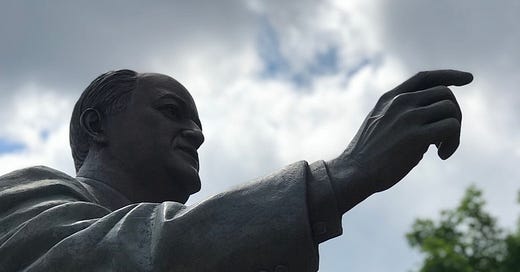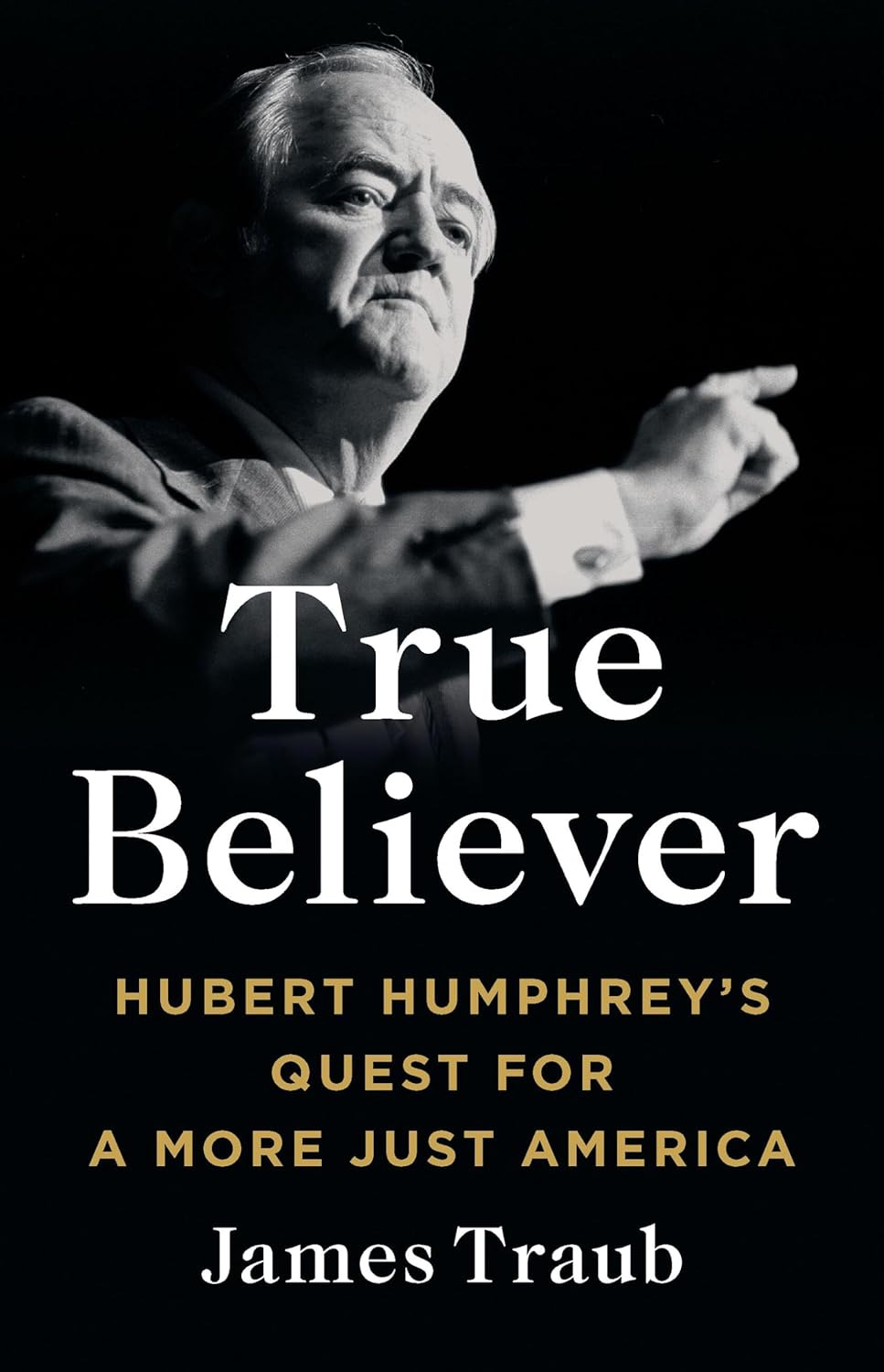Hubert Humphrey—Now More Than Ever
A review of James Traub's "True Believer: Hubert Humphrey's Quest for a More Just America."
America could use a lot more Hubert Humphrey—and more Hubert Humphreys—these days.
That’s the main thought that kept running through my head reading James Traub’s excellent new biography, True Believer: Hubert Humphrey’s Quest for a More Just America. As a native Minnesotan, I may of course be biased; Humphrey stands alongside Prince, Bob Dylan, and Charles Lindbergh as one of the most important and influential national figures to come out of our state. (Not for nothing did we name a sports stadium and international airport terminal after him.) Though his achievements were substantial—committing the national Democratic Party to civil rights in 1948 and shepherding the Civil Rights Act of 1964 through the U.S. Senate, for starters—Humphrey rarely receives the recognition he deserves today, in part due to his humiliating tenure as Lyndon B. Johnson’s vice president at the height of the Vietnam War.
The definitive Humphrey biography remains to be written. But Traub’s easy-to-read account brings the spirit of Humphrey’s politics to life in ways that go beyond a simple tally of his achievements and failings. As Traub makes clear, the innate ebullience and unflagging optimism at the heart of Humphrey’s personality were as just as important to his politics as the bold, big-hearted brand of New Deal liberalism he advocated throughout his public life—a faith that took progress where it came and stood strong for what came to be known as the vital center against illiberalism on the left as well as the right. It’s a spirit of politics that was uncommon in Humphrey’s day and all but extinct in our own, but it’s one our national politics desperately needs now more than ever.
Traub captures Humphrey’s defining qualities—his irrepressible exuberance and incorrigible optimism—exceptionally well. These traits were apparent early on in Humphrey’s life, and as Traub notes they were unaffected and in some sense ingrained; they were simply who Humphrey was, and they were as much a part of his politics as any policy or program. They also provided the foundation for Humphrey’s unyielding faith in America and its possibilities, a faith that would put him increasingly out of step with elite and activist opinion when he mounted his ill-fated campaign for president in 1968. As he himself put it in his last speech before election day, “I have believed that within the sharecropper, the son of the immigrant, the grandson of the slave lay such human potential that America has only to call it forth to see its full realization.”
At the same time, Humphrey tempered his inveterate idealism with pragmatism and a willingness to compromise. He wanted to be more than just another liberal ideologue in the Senate, delivering fiery speeches and remaining ideologically pure while accomplishing next to nothing of substance. Above all else, Humphrey wanted to get things done and actually make progress—in seeming contrast to fellow liberal senators like Paul Douglas of Illinois. That meant forging relationships with other legislators across partisan, sectional, and ideological lines, to the point where Humphrey claimed to “have as many, or more, friends among Southern Democrats here in the Senate as I have among the Northerners.” While Douglas and other liberals refused to associate themselves too closely with the Senate’s then-majority leader Lyndon Johnson, Humphrey “warmed to Johnson immediately” and learned lessons in the dark arts of Senate politicking from him.
More importantly, though, Humphrey’s pragmatism meant accepting at least some progress rather than holding out for everything and winding up with nothing. Humphrey took flak from liberals for his close relationship with Johnson and his willingness to back half-loaf or even quarter-loaf compromises like the Civil Rights Act of 1957. Traub sums up Humphrey’s logic: “No one knew better than Humphrey how paltry the legislation was; but he also knew that nothing like it has passed before.” Or as Humphrey himself told civil rights leader Roy Wilkins, “if there’s one thing I’ve learned in politics, it’s never to turn your back on a crumb.” Humphrey’s approach to politics paid off spectacularly in 1964, when he steered that year’s epochal civil rights legislation through a Senate filibuster and into the law of the land. For Humphrey, compromise didn’t mean abandoning one’s principles but instead provided a way to make them real—either in whole or in part, immediately or down the road.
Lyndon Johnson considered Humphrey to be the only liberal in the Senate he could work with to get things done. But Humphrey himself had no truck with the indecent left of his own time, and indeed had to purge Communists and their fellow travelers from the Minnesota’s Democratic-Farmer-Labor Party ahead of his 1948 U.S. Senate run. As Traub notes, Humphrey understood quite well the left’s skill at organization and its tendency to fight dirty; in 1946, fellow travelers shouted Humphrey down and prevented the then-mayor of Minneapolis from delivering a speech at his local DFL convention. With help from the newly-formed liberal pressure group Americans for Democratic Action, though, Humphrey and his allies (including future elected officials like Orville Freeman, later governor of Minnesota and secretary of agriculture, and Walter Mondale, later senator and vice president under Jimmy Carter) “would do to the Communists what the Communist cadre had done to the DFL.” In Humphrey’s own words, “we were just as tough as the Communists were—and sometimes just as mean.”
At bottom, Humphrey understood that the illiberal left posed just as much a threat to his own brand of New Deal liberalism as did anyone on the right. Humphrey had once admired former vice president Henry Wallace and seen him as the future standard-bearer of the Democratic Party, but Wallace’s increasingly pro-Soviet foreign policy views and strident anti-anti-Communism alienated Humphrey. When Wallace proposed consigning Eastern Europe to a Soviet sphere of influence in a nationally-broadcast 1946 speech, Humphrey was appalled and compared Wallace to Neville Chamberlain. “The police state is the police state,” Humphrey believed, no matter its ideological uniform; too many progressives, he contended, were “not clear in their own mind that the Communist state is of the menacing proportions of the fascist state.” While Wallace and other fellow travelers fulminated against the Marshall Plan and other aspects of President Harry S. Truman’s foreign policy, Humphrey and the ADA endorsed it. Indeed, the Marshall Plan would remain a political and policy touchstone for Humphrey throughout his political career. As late as 1976, for instance, Humphrey called for a Marshall Plan to rebuild America’s cities.
For all of Humphrey’s political gifts and genuine accomplishments, however, he had his fair share of flaws and foibles. His genuine affection for other people—what Traub calls his “love of his fellow man”—aided him on the campaign trail and in the halls of Congress, but it could all too easily slide into a pathological need to people-please. Lyndon Johnson, for one, recognized Humphrey’s desire for approval early on and repeatedly took advantage of it during their time in the Senate; he outright abused and humiliated Humphrey both as his potential running mate in 1964 and then for four years as vice president. Worse, it led LBJ to ignore Humphrey’s warnings about deeper American military involvement in Vietnam; in a prescient 1965 memo, Humphrey had cautioned Johnson against mortgaging his presidency to the war. Johnson subsequently excommunicated his vice president from his war councils, and Humphrey responded by doing his best to ingratiate himself with Johnson and support a Vietnam policy that, as Traub’s account makes clear, he had quite sincerely come to believe in. Likewise, Humphrey’s ambition for higher office made him perhaps too quick to compromise when he perhaps should have held out for a bit more from his interlocutors.
Humphrey succumbed to terminal bladder cancer in 1978, less than a decade into an impressive political comeback that saw him elected to the Senate in 1970 and contend twice more for the Democratic presidential nomination. His achievements as a political leader and a legislator far outweigh his flaws and shortcomings, and we could certainly use his spirit today. Our own politics would undoubtedly benefit from Humphrey’s undaunted optimism and utterly sincere exuberance. These qualities may have, as Traub argues, made Humphrey vulnerable to more ruthless politicians—but they’re also what made Humphrey great in his time and a valuable example for our own.
Above all, Humphrey’s life shows that liberalism is more than just a political and policy program—it’s a spirit and an attitude toward public life and politics, one we’d all do well to follow today. It’s an idea Traub has conveyed admirably well with True Believer, and something we’ve tried in our way to cultivate here at The Liberal Patriot. Decades on, Hubert Humphrey offers us the sort of approach to politics and public life we need so desperately today—and reminds us that such a politics is indeed possible.






